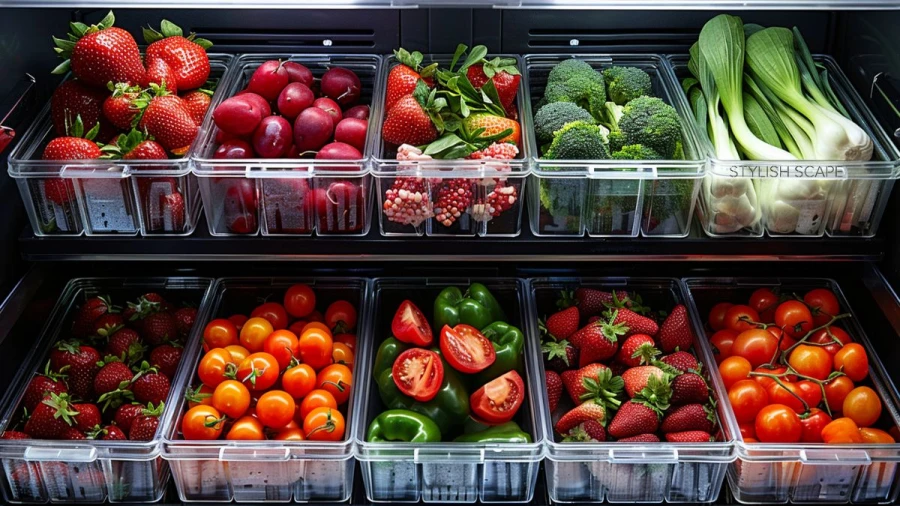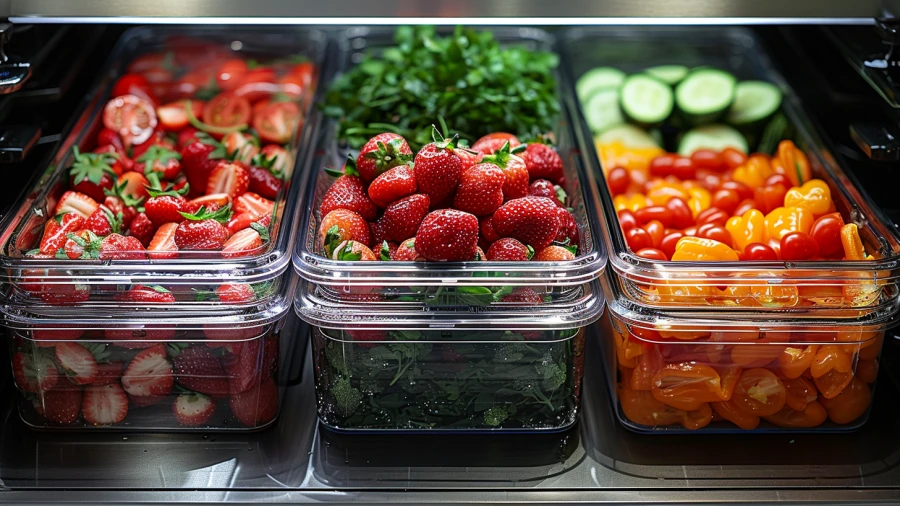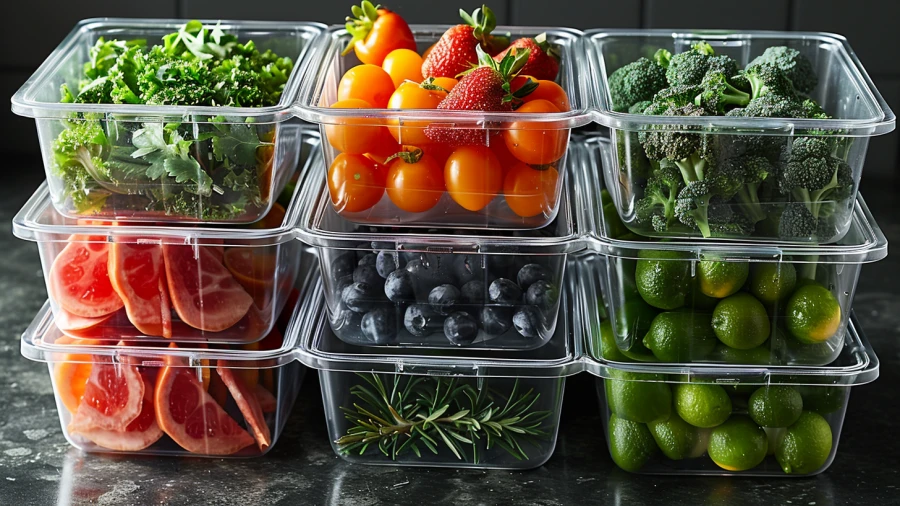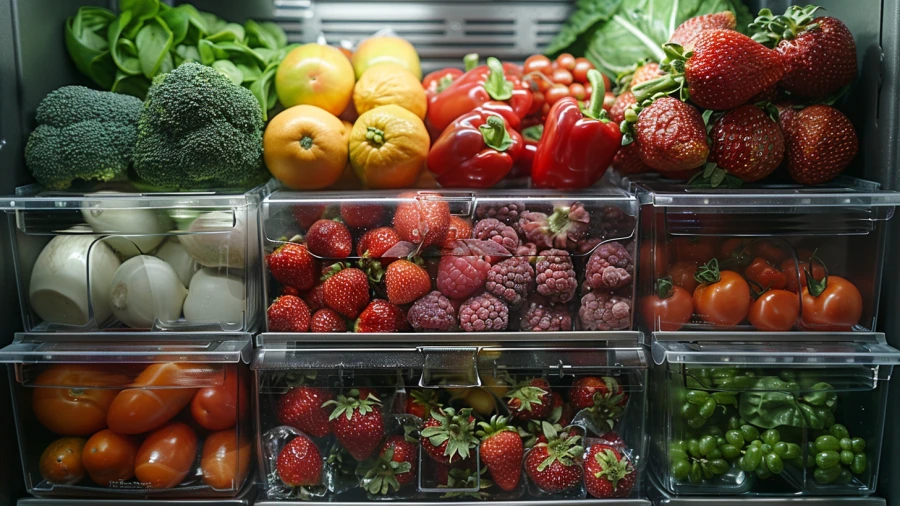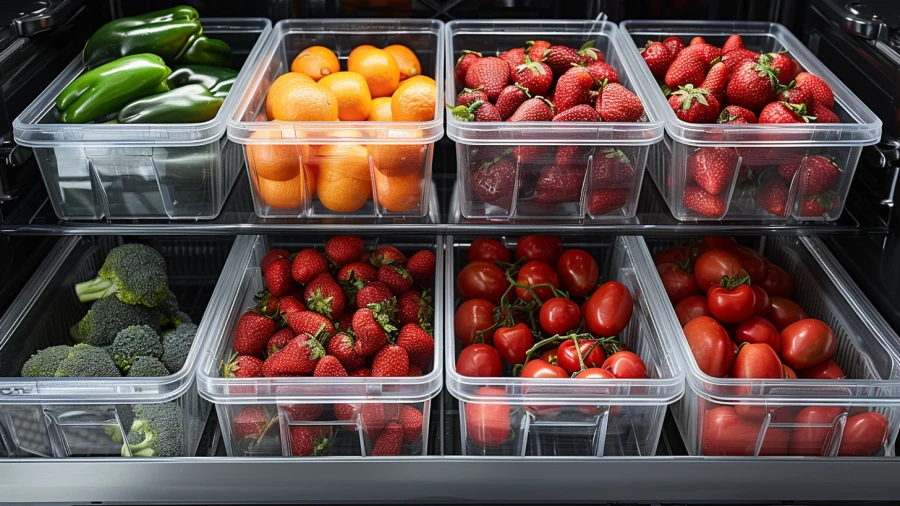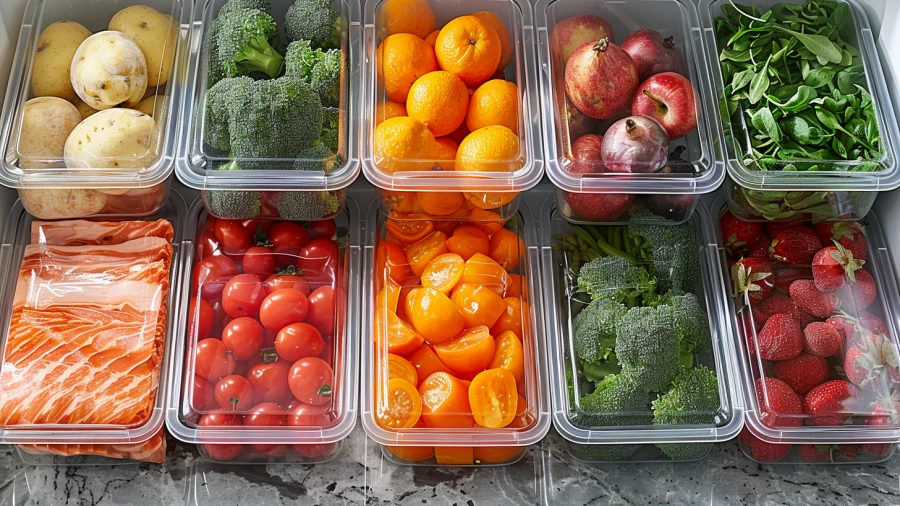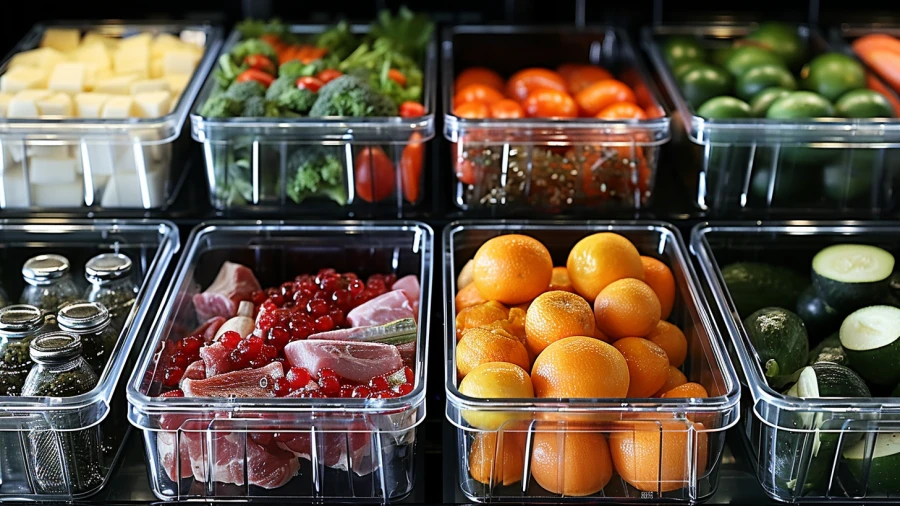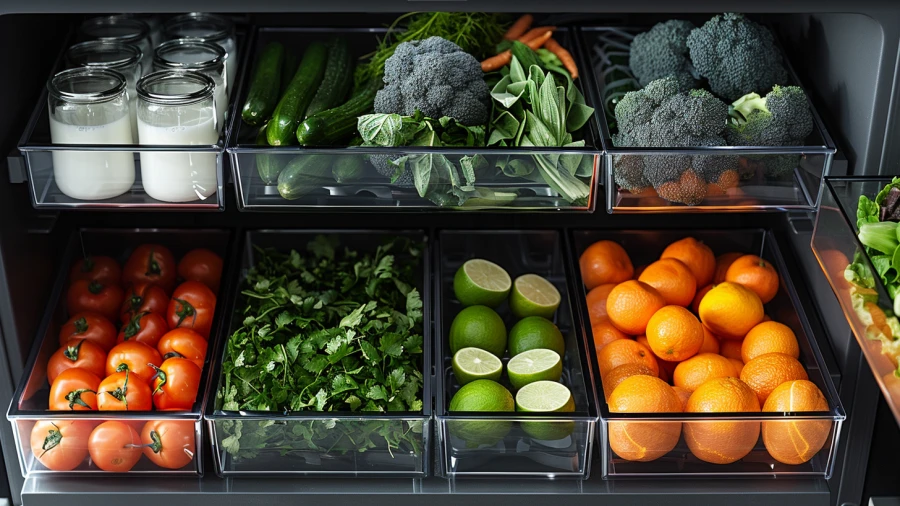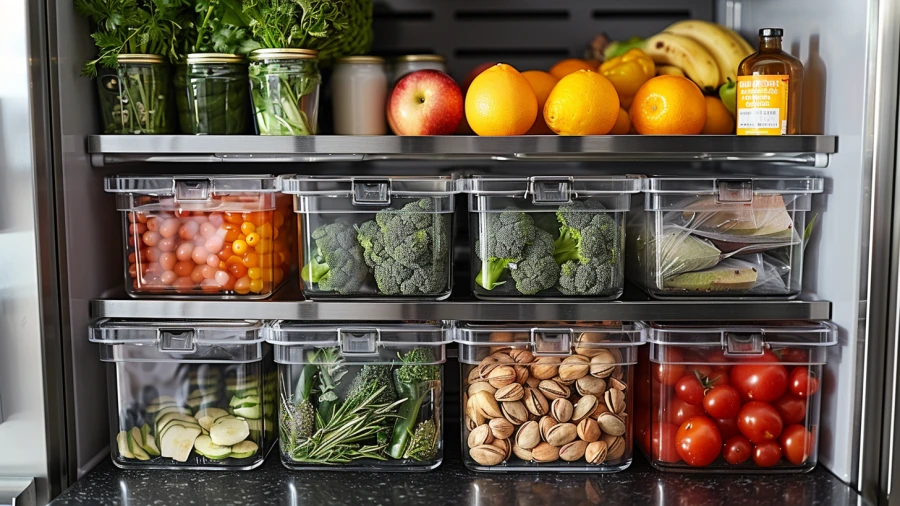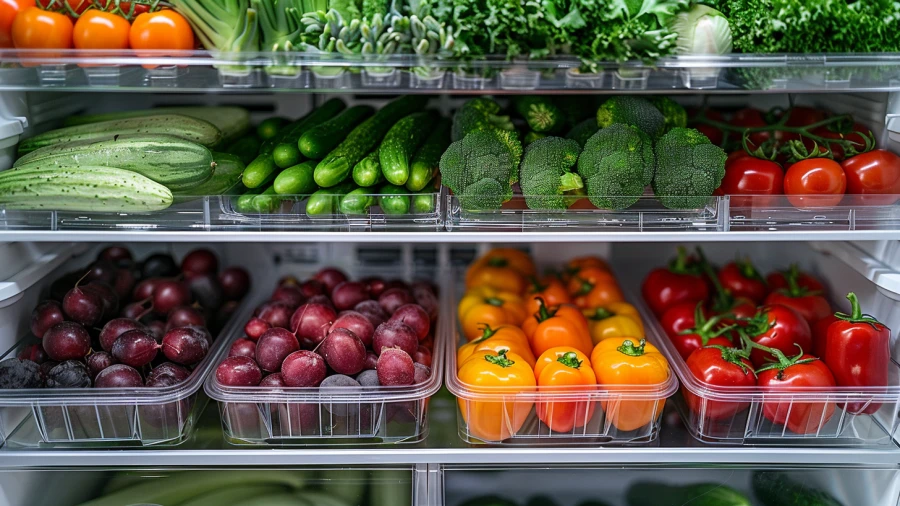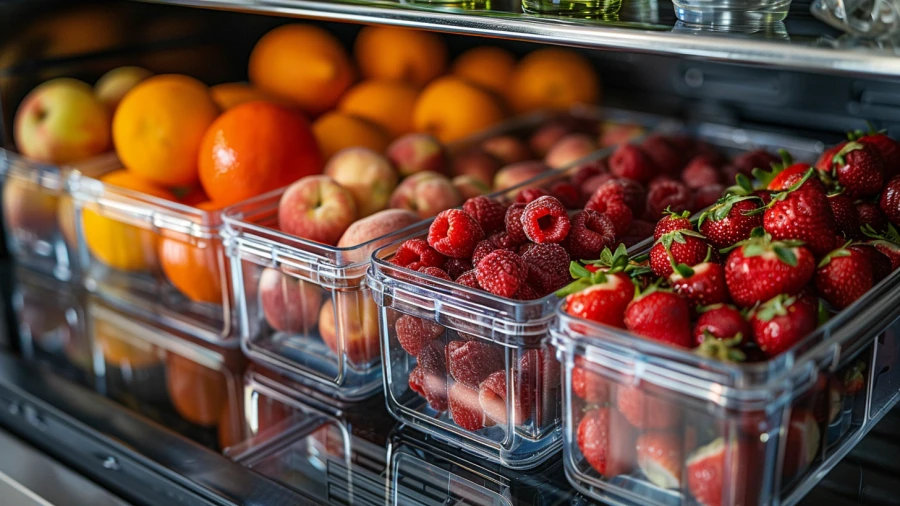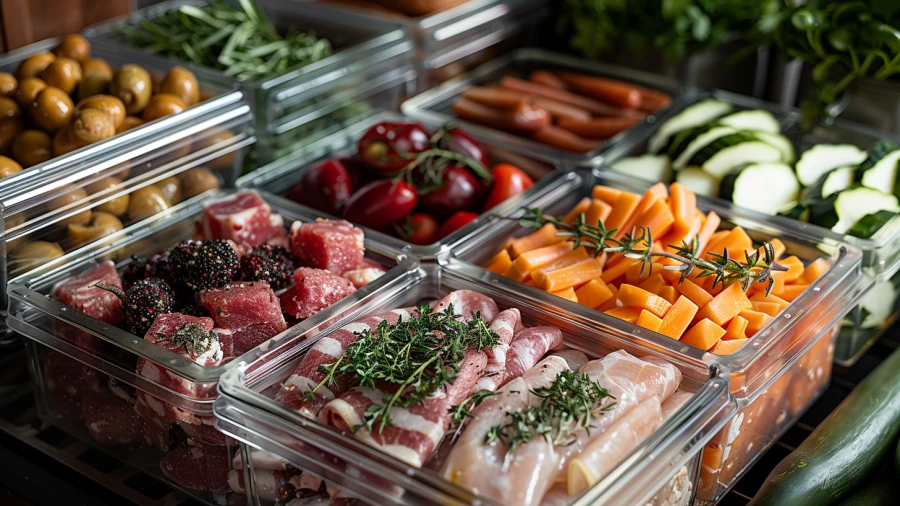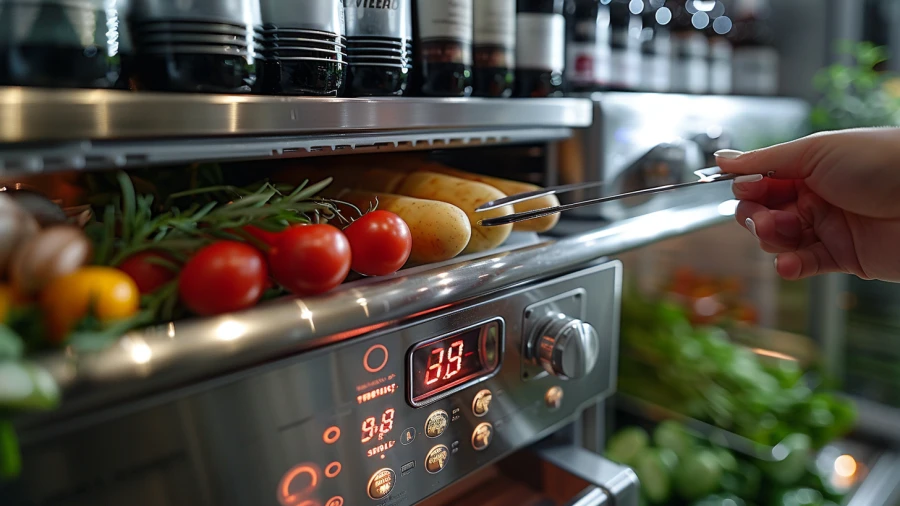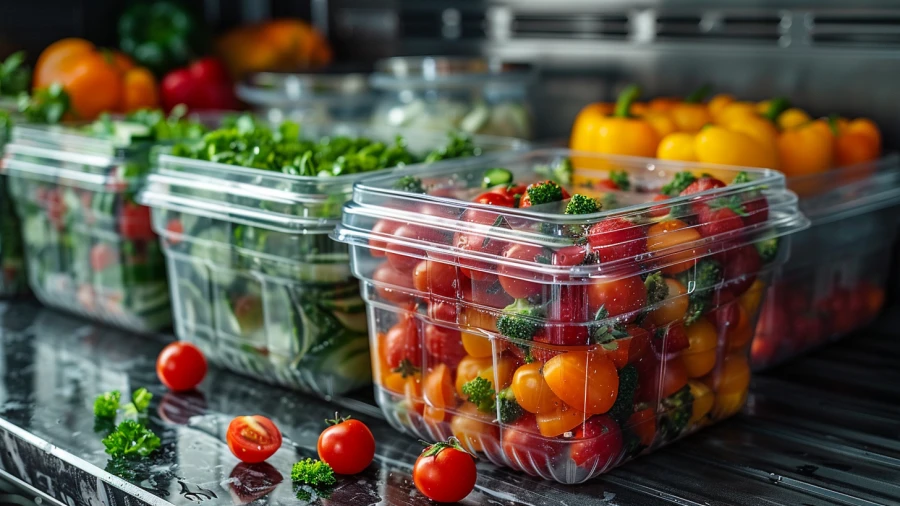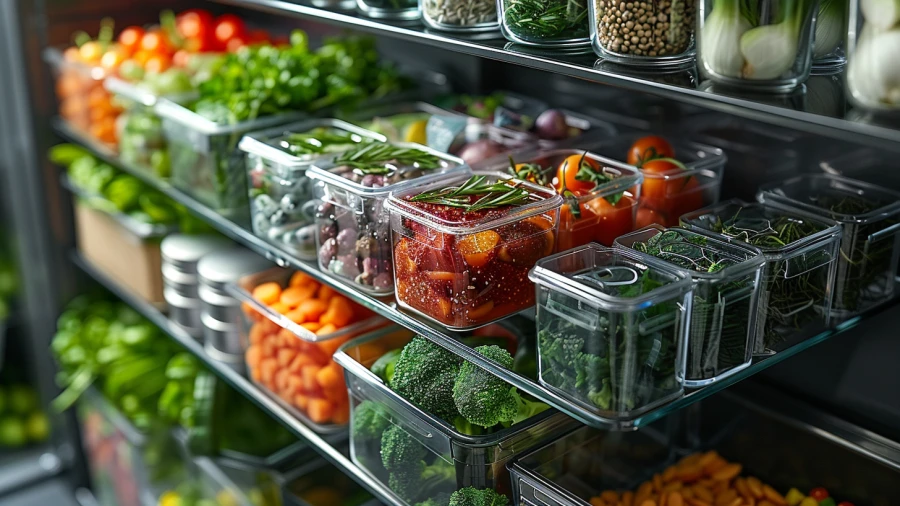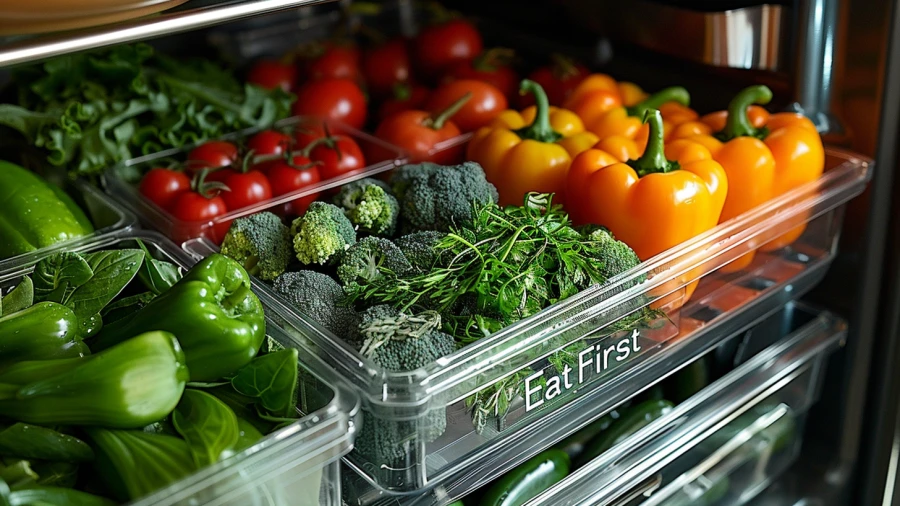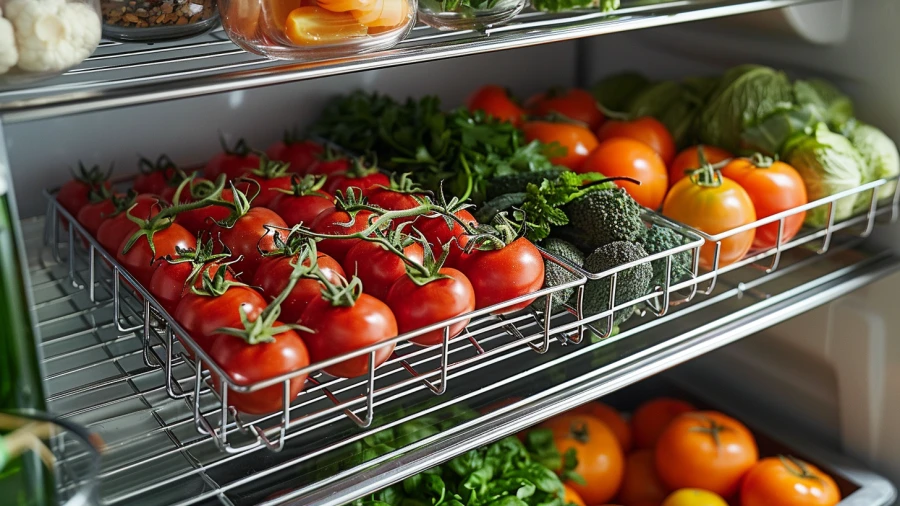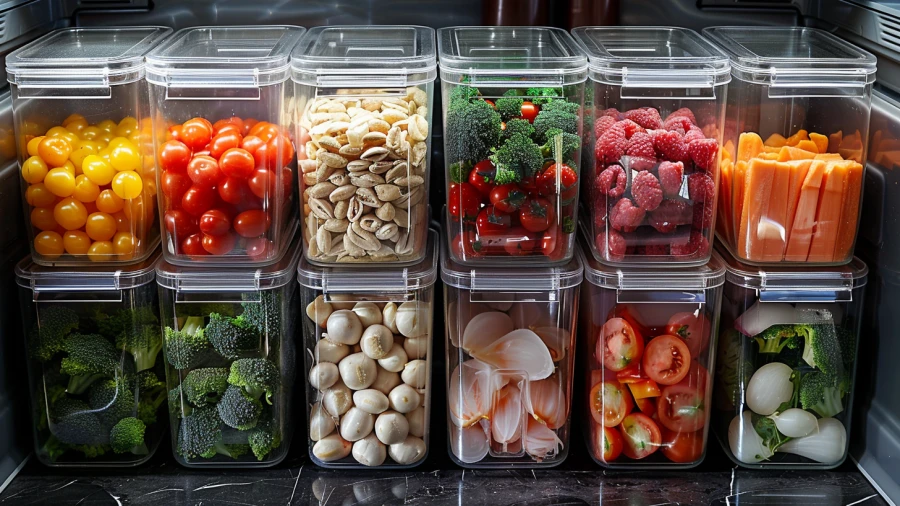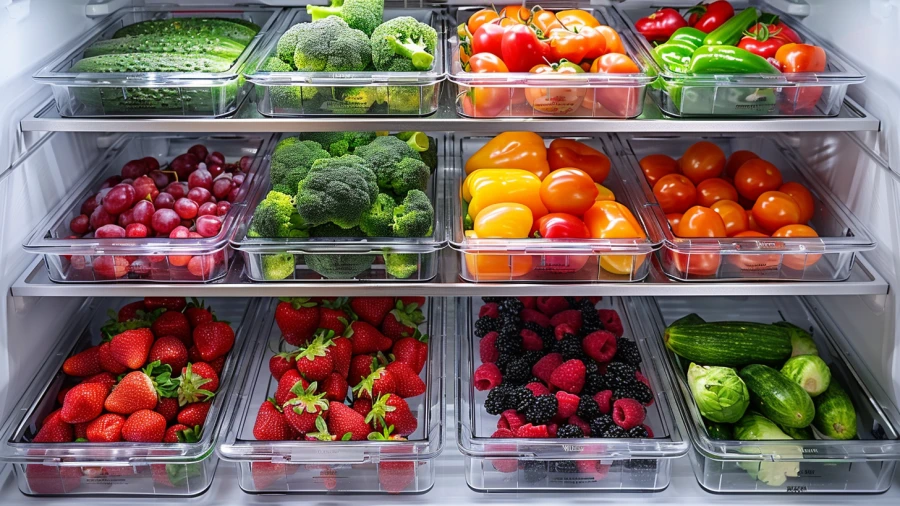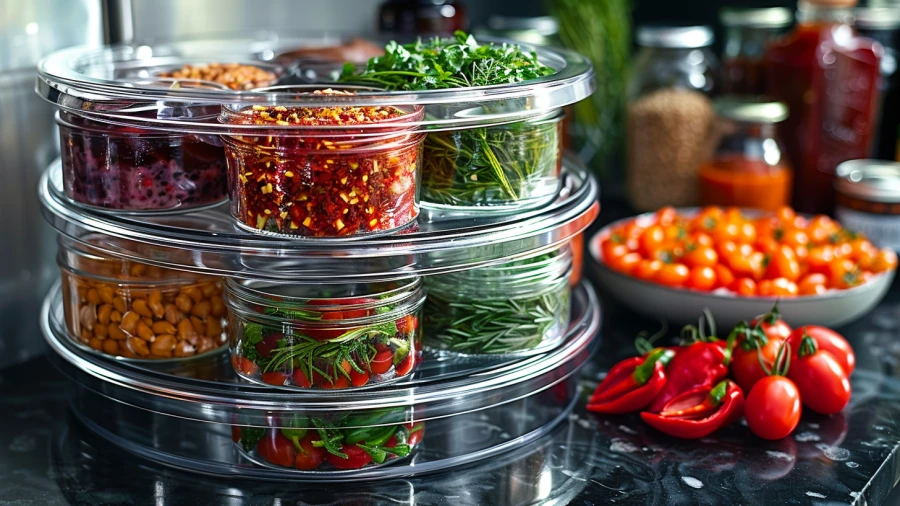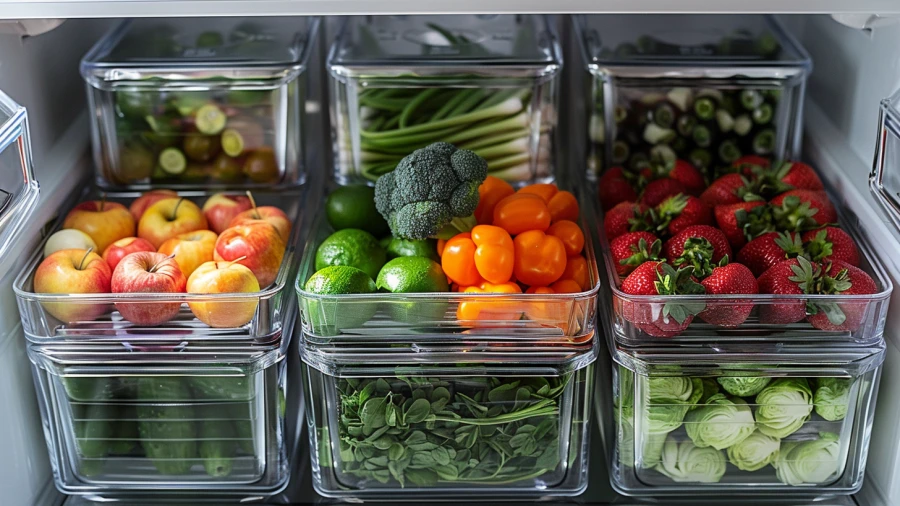
20 Smart Refrigerator Organization Ideas for a Neat and Tidy Fridge
Discover innovative refrigerator organization ideas to maximize space, reduce waste, and streamline your kitchen. From clear containers and adjustable shelves to turntables and labeled bins, these Refrigerator Organization Ideas tips will help keep your fridge neat and efficient.
by Priyanka P
Updated Sep 04, 2024
On This Page
- Refrigerator Organization Ideas
- Use Clear Containers for Easy Visibility in the Refrigerator
- Choose Stackable Containers for Efficient Use
- Place Expiring Food at the Front of the Refrigerator
- Use Bins Designed for Refrigerators
- Incorporate Storage Bags for Small Items in the Refrigerator
- Organize by Food Categories
- Position Frequently Used Items in the Door of the Refrigerator
- Set Up a Snack Zone
- Adjust Shelves to Fit Your Needs in the Refrigerator
- Store Beverages in Dedicated Bins
- Add Dividers to the Deli Drawer in the Refrigerator
- Install a Thermometer Inside the Fridge
- Label Leftovers with Masking Tape in the Refrigerator
- Utilize Magnetic Organizers for Small Items
- Create an “Eat First” Bin for Near-Expiry Items in the Refrigerator
- Add Racks Over the Shelves
- Replace Bulky Boxes with Storage Containers in the Refrigerator
- Follow a Regular Cleaning Routine
- Use Turntables for Condiments in the Refrigerator
- Maximize Door Storage Space
- How Can I Prevent Food From Going Bad in the Refrigerator?
Refrigerator Organization Ideas
Refrigerator organization helps keep your food fresh and easy to find. Start by using clear containers so you can quickly see what’s inside. Place items nearing expiration at the front to use them up before they go bad. Use storage bags for smaller items and keep frequently used foods in the door for easy access. Adjust shelves to fit your needs and add dividers in the deli drawer to keep things tidy.
Label leftovers with masking tape to track their freshness. Create an “eat first” bin for items about to expire and replace bulky boxes with compact containers. Using turntables for condiments can make it easier to reach everything. Regularly clean your fridge to maintain order and avoid waste.
Use Clear Containers for Easy Visibility in the Refrigerator
Clear containers are essential for effective refrigerator organization. They allow you to see the contents without opening the container, which helps you quickly identify what you have and what you need. This visibility can prevent food from getting lost and reduce waste.
Opt for durable materials like glass or BPA-free plastic, which are not only clear but also safe for food storage. Labeling these containers with contents and dates can further streamline your organization and ensure you use items before they expire. Stackable designs maximize vertical space and keep your fridge neat. By using clear containers, you can maintain an organized, efficient, and visually appealing refrigerator, making meal planning and preparation much easier.
Choose Stackable Containers for Efficient Use
Stackable containers are ideal for maximizing refrigerator space. They help you make the most of vertical space, allowing you to store more items neatly. Choose containers designed to nest securely on top of each other to prevent tipping and collapsing. Stackable containers are especially useful for organizing similar items, such as fruits, vegetables, or leftovers, making it easier to find what you need quickly.
Look for containers that are easy to clean and durable enough to withstand regular use. This organization method also simplifies cleaning, as containers can be easily removed and washed. By utilizing stackable containers, you create a more organized and spacious refrigerator, reducing clutter and enhancing accessibility.
Place Expiring Food at the Front of the Refrigerator
Storing expiring food at the front of the refrigerator is a simple yet effective way to reduce food waste. Items that are nearing their expiration date should be positioned where they are most visible and accessible. This practice encourages you to use up these items before they spoil, preventing them from being pushed to the back and forgotten.
Regularly check your fridge and rearrange items to ensure that those with the shortest shelf life are upfront. This approach not only helps save money by using up what you have but also maintains a cleaner and more organized refrigerator. Keeping expiring items in sight is a proactive strategy for better food management.
Use Bins Designed for Refrigerators
Specially designed refrigerator bins are crucial for maintaining an organized fridge. These bins come in various shapes and sizes, perfect for grouping similar items like fruits, vegetables, or dairy products. They help prevent items from getting lost or forgotten, making it easier to find what you need quickly. Choose bins that fit the dimensions of your refrigerator shelves and offer features like handles for easy access.
Transparent bins allow you to see the contents without opening them, and bins with lids can help keep items fresh longer. Using refrigerator bins simplifies cleaning, as they can be easily removed and washed. This organizational tool helps keep your fridge tidy and functional.
Incorporate Storage Bags for Small Items in the Refrigerator
Storage bags are an excellent solution for organizing smaller items in the refrigerator. They are versatile, can fit into tight spaces, and are ideal for items like cheeses, meats, or vegetables. Silicone or reusable plastic bags are durable and can be used to store portions or oddly shaped items that don’t fit well in traditional containers.
For added organization, consider using a slatted organizer to keep the bags upright and accessible. Label the bags to easily identify contents and avoid confusion. Incorporating storage bags into your refrigerator helps reduce clutter and ensures that every item has its place, making it easier to find and use what you need.
Organize by Food Categories
Organizing your refrigerator by food categories is an effective method for maintaining order and efficiency. Group similar items together, such as dairy products, meats, vegetables, and condiments. This categorization helps you quickly locate what you need and makes meal planning easier.
Use bins or drawer dividers to separate each category and prevent items from mixing together. Regularly reassess and adjust your organization system based on your cooking habits and the types of food you frequently purchase. By keeping similar items in designated areas, you create a more functional and visually appealing refrigerator, which can also help reduce food waste and improve overall food management.
Position Frequently Used Items in the Door of the Refrigerator
The refrigerator door is an ideal spot for storing frequently used items. This area is easily accessible and convenient for items like milk, butter, and condiments. However, keep in mind that the door is subject to temperature fluctuations, so avoid placing items that require a more stable temperature.
Arrange items in the door based on your personal usage patterns, making sure the most frequently accessed items are within easy reach. This practice helps keep your main shelves uncluttered and ensures that you can quickly grab what you need. Properly organizing the door can also enhance overall refrigerator efficiency and functionality.
Set Up a Snack Zone
Creating a dedicated snack zone in your refrigerator can help streamline access to your favorite snacks and reduce clutter. Choose a specific shelf or bin for easy-to-grab items like fruits, yogurt, or pre-cut vegetables. This makes it simpler to grab a quick snack and keeps these items organized and separate from other foods.
Regularly stock and tidy this zone to ensure it remains functional and inviting. By having a designated area for snacks, you also encourage healthier eating habits and make it easier to keep track of what you have on hand, reducing the chance of food going to waste.
Adjust Shelves to Fit Your Needs in the Refrigerator
Adjusting the shelves in your refrigerator is key to optimizing storage space and accommodating your specific needs. Most refrigerators feature adjustable shelving that can be repositioned to create more room for taller items or smaller shelves for different food types. Take the time to assess your usual food items and adjust the shelves accordingly.
This customization helps maximize available space and ensures that you can easily store and access everything you need. Regularly reevaluate your shelf arrangement as your storage needs change, and make adjustments to maintain an organized and efficient refrigerator.
Store Beverages in Dedicated Bins
Dedicated bins for beverages help keep your refrigerator organized and make it easier to access drinks. Use bins specifically designed to hold items like water bottles, juices, and soda cans. This prevents beverages from cluttering up other areas of the fridge and ensures they are easily accessible when you need them.
Choose bins that fit well within your refrigerator’s dimensions and can support the weight of the beverages. By using dedicated bins, you create a more organized and functional refrigerator, making it easier to keep track of your drink inventory and reduce clutter.
Add Dividers to the Deli Drawer in the Refrigerator
Dividers in the deli drawer are a practical addition for keeping meats, cheeses, and other cold cuts organized. These dividers help separate different types of deli items, preventing them from mixing and making it easier to find what you need. Choose adjustable dividers that can fit the size of your drawer and customize the space according to your needs.
By using dividers, you create a more structured and accessible deli drawer, which can help reduce food waste and improve overall organization within your refrigerator.
Install a Thermometer Inside the Fridge
Installing a thermometer inside your refrigerator is essential for maintaining the proper temperature and ensuring food safety. A thermometer helps you monitor the internal temperature to ensure it stays at or below 40°F (4°C), which is crucial for preventing food spoilage. Regularly check the thermometer to verify that your fridge is operating efficiently.
This simple tool can also help you troubleshoot any temperature-related issues and ensure that your food stays fresh and safe to eat. Keeping an eye on the temperature helps maintain the optimal environment for your refrigerated items.
Label Leftovers with Masking Tape in the Refrigerator
Labeling leftovers with masking tape is an effective method for tracking what you have in your refrigerator. Write the date and contents on the tape and attach it to the container. This practice helps you quickly identify leftovers and ensures they are used before they spoil.
Masking tape is inexpensive, easy to apply, and won’t leave a sticky residue. For a more streamlined approach, consider investing in a label maker. Labeling leftovers helps reduce food waste and keeps your refrigerator organized, making it easier to manage your food inventory.
Utilize Magnetic Organizers for Small Items
Magnetic organizers are a useful tool for storing small items in your refrigerator. These organizers attach to the fridge’s interior walls or door and help keep items like spice jars or condiments neatly arranged. They maximize vertical space and reduce clutter by keeping smaller items in one place.
Choose magnetic organizers with strong magnets and durable materials to ensure they stay in place and can hold items securely. This organizational solution helps improve refrigerator functionality and makes it easier to find and access smaller items.
Create an “Eat First” Bin for Near-Expiry Items in the Refrigerator
An “Eat First” bin is a dedicated container for items nearing their expiration dates. Place this bin at eye level in your refrigerator so it’s the first thing you see when you open the door. This encourages you to use these items before they spoil, reducing food waste and saving money.
Regularly check and replenish the bin to ensure it remains up-to-date. By having a designated spot for near-expiry items, you streamline food management and maintain a more organized and efficient refrigerator.
Add Racks Over the Shelves
Adding racks over the shelves in your refrigerator can help maximize vertical space and improve organization. These racks provide additional layers for storing smaller items or frequently used products without taking up extra shelf space. Choose racks that fit securely in your fridge and are adjustable if possible.
This solution helps keep your refrigerator organized, reduces clutter, and makes it easier to find and access items. Racks can be particularly useful for organizing condiments, snacks, or other small items, enhancing overall functionality.
Replace Bulky Boxes with Storage Containers in the Refrigerator
Replacing bulky food boxes with space-saving storage containers helps improve refrigerator organization and maximize available space. Transfer contents from large, bulky boxes into smaller, stackable containers to reduce clutter and make it easier to find what you need.
This method also helps keep your refrigerator tidy and makes better use of vertical space. Ensure that containers are airtight to maintain freshness and label them for easy identification. By using storage containers, you create a more organized and efficient refrigerator.
Follow a Regular Cleaning Routine
A regular cleaning routine is essential for maintaining an organized and hygienic refrigerator. Schedule regular intervals to clean out expired or spoiled items, wipe down shelves, and sanitize surfaces. This practice prevents unpleasant odors and helps maintain the efficiency of your refrigerator.
Regular cleaning also provides an opportunity to reassess and adjust your organizational system as needed. By keeping your refrigerator clean and organized, you ensure a healthier food environment and make it easier to manage your food inventory.
Use Turntables for Condiments in the Refrigerator
Turntables are an excellent tool for organizing condiments in your refrigerator. They allow you to easily access items without having to dig through cluttered shelves. Place frequently used condiments on the turntable and simply spin it to find what you need. This method helps keep your fridge organized and makes it easy to locate and retrieve bottles or jars.
Choose a turntable with a non-slip base to ensure stability and prevent items from tipping over. Using turntables enhances overall organization and accessibility.
Maximize Door Storage Space
The door of your refrigerator offers valuable storage space that is often underutilized. Maximize this area by using bins or organizers designed for door shelves. Store items like sauces, condiments, and beverages here to keep them easily accessible. Avoid placing items that require a stable temperature, as the door area experiences more temperature fluctuations.
Efficiently organizing door space helps declutter the main shelves and improves overall refrigerator functionality. By utilizing this space effectively, you create a more organized and accessible refrigerator.
How Can I Prevent Food From Going Bad in the Refrigerator?
To prevent food from going bad in the refrigerator:
- Store Expiring Items Upfront: Place items nearing their expiration date at the front of the fridge to ensure they’re used before they spoil.
- Use Clear Containers: Store food in clear containers to easily see what’s inside and avoid forgetting about items.
- Label Leftovers: Use masking tape or labels to mark the date when leftovers were stored, helping you track their freshness.
- Adjust Temperature: Ensure your fridge is set to the correct temperature (usually between 37-40°F or 3-4°C) to keep food fresh.
- Organize by Food Category: Group similar items together, such as meats, vegetables, and dairy, to prevent cross-contamination and make it easier to access what you need.
- Regular Cleaning: Clean your fridge regularly to remove expired or spoiled food and maintain a hygienic environment.
Refrigerator Organization Ideas - FAQs
1. What are the best ways to keep my refrigerator organized?
Use clear containers for visibility, label leftovers, place expiring items at the front, and adjust shelves to fit your needs. Incorporate bins and dividers for better categorization.
2. What type of containers should I use for organizing my refrigerator?
Opt for clear, stackable containers and storage bags for smaller items. Replace bulky boxes with compact containers to save space.
3. How can I make it easier to access frequently used items?
Place commonly used items like milk and condiments in the door of the refrigerator and keep snacks in a dedicated zone for quick access.
4. What should I do if I have limited fridge space?
Use turntables for condiments, add racks over shelves, and utilize magnetic organizers for small items to maximize available space.
5. How often should I clean my refrigerator to keep it organized?
Aim to clean your refrigerator every 1-2 weeks. Regular cleaning helps maintain organization, remove expired items, and ensure a hygienic environment for your food.
